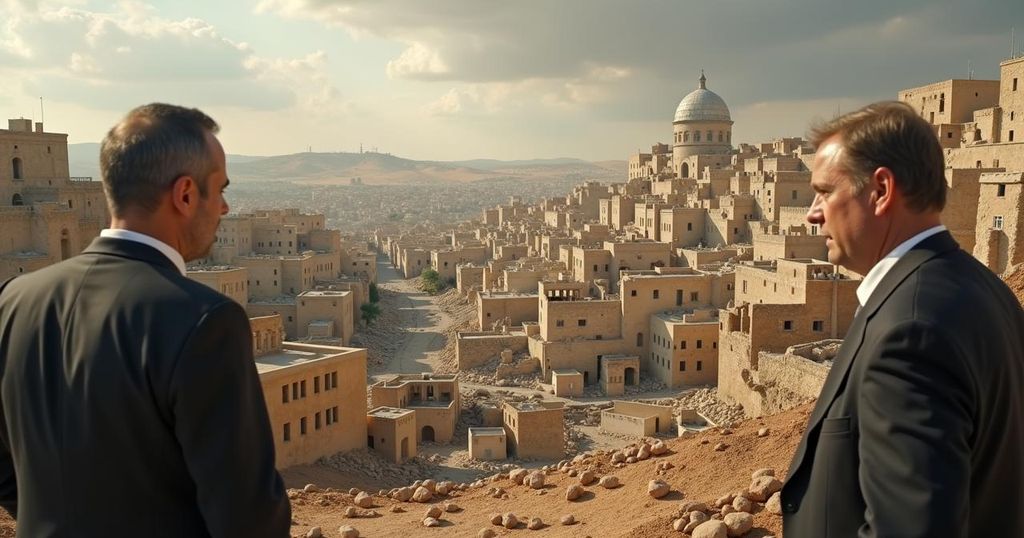Blinken Considers Post-War Strategy for Gaza Amid Complex Regional Dynamics
Secretary of State Antony Blinken is deliberating a post-war strategy for Gaza, developed with Israel and the UAE, to be proposed after the presidential election. Concerns arise regarding the potential marginalization of Palestinian Authority President Mahmoud Abbas, and existing tensions complicate the plan’s execution. Internal debates within the U.S. highlight divisions over the plan’s approach and its reception by regional actors.
Secretary of State Antony Blinken is contemplating a post-war strategy for Gaza, crafted in collaboration with Israel and the United Arab Emirates (UAE), which is expected to be unveiled subsequent to the presidential election. While the proposed plan aims to address the ongoing conflict, there is apprehension among U.S. officials that it could undermine Palestinian Authority President Mahmoud Abbas and his administration. This concern arises as the current situation remains precarious, with the absence of a negotiated agreement to release hostages held by Hamas and establish a ceasefire. Various officials believe that introducing a foresight plan could contribute positively to the Biden administration’s legacy surrounding the conflict. Discussions regarding this strategy have been taking place for months among U.S., Israeli, and Emirati officials, with former British Prime Minister Tony Blair also engaged in initial talks. In July, key figures from the Biden administration convened in Abu Dhabi to explore these plans further. The Emirati proposal endorsed an international mission to provide humanitarian assistance and establish governance in Gaza, contingent upon the Palestinian Authority’s reforms and leadership changes, particularly the replacement of Abbas and his loyalists. Recent dialogues have intensified, with the Israeli Minister for Strategic Affairs and the Emirati Foreign Minister meeting with Blinken during the UN General Assembly. Both parties expressed the desire for U.S. assistance in reconciling differences in the proposed plan, which is perceived as a potential U.S. initiative post-election. Key points of contention remain, particularly regarding the reopening of the U.S. consulate in Jerusalem—a stipulation the Israelis oppose—alongside the role of the Palestinian Authority in the Gaza transition. Internal divisions within the State Department regarding this plan have become evident, as differing opinions have reportedly led to significant debates between Blinken’s staff and other senior diplomats. Some officials have voiced strong opposition to the viability of the Israeli-Emirati plan, underscoring concerns about its reception in the region and the delicate dynamics of Palestinian governance.
The ongoing conflict in Gaza has created a complex geopolitical scenario involving multiple stakeholders, including the Biden administration, Israeli government, UAE, and the Palestinian Authority. The proposed post-war strategy seeks to establish a foundation for governance and humanitarian aid in Gaza, yet it faces significant hurdles, particularly pertaining to the legitimacy of the Palestinian Authority under Mahmoud Abbas. The plan is further complicated by differing interests among the involved parties, particularly between Israeli ambitions and the rights of the Palestinian people. Approval from the Palestinian Authority is considered essential, yet there are voices within the U.S. government that express skepticism regarding the plan’s feasibility and its potential repercussions for Palestinian governance.
In summary, Secretary of State Antony Blinken is evaluating a post-war plan for Gaza that has emerged from discussions with Israel and the UAE, targeting a presentation post-election. However, concerns about marginalizing the Palestinian Authority and lack of a ceasefire signal challenges ahead. As negotiations progress, the role of the Palestinian Authority, internal U.S. debates, and regional reception will play pivotal roles in determining the plan’s success and its implications for lasting peace and governance in the region.
Original Source: www.axios.com




Post Comment